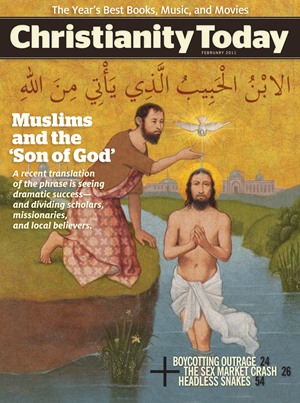Translation is Important But Worth Less Than Love: A Review Essay by Jonathan Downie
 Collin Hansen, “The Son And the Crescent: Bible translations that avoid the phrase ‘Son of God’ are bearing dramatic fruit among Muslims. But that translation has some missionaries and scholars dismayed” Christianity Today (February 2011), pages 18-23.
Collin Hansen, “The Son And the Crescent: Bible translations that avoid the phrase ‘Son of God’ are bearing dramatic fruit among Muslims. But that translation has some missionaries and scholars dismayed” Christianity Today (February 2011), pages 18-23.
Translation choices continue to be a major issue for the church. While preparing this review, news showed that the choices made in a further update to the NIV has led to a prominent denomination expressing disappointment with two large Christian publishers. As a professional translator, I obviously care about the choices translators make. However, as a believer, I care much more for my brothers and sisters in Christ.
There is no doubt that the translation issue covered in the article covered by this review is an important one: what should Bible translators do with concepts and phrases that might cause offence? What if a cultural or linguistic understanding of a Biblical phrase could prevent a barrier to someone receiving Christ? How far should translators go in their work to present the Word of God in a language people understand?
The specific example in this article is by no means an easy one. For many Muslims, the phrase “Son of God” paints the picture of God having physical sexual relations with Mary, an idea which is an anathema both to them and, I would imagine, to the vast majority of Evangelical Christians. We all understand that the Biblical writers are here intending to paint a picture of Jesus conception by the Holy Spirit and His intimacy with the Father.
The phrase “Son of God” therefore, is clearly a critical Biblical concept. It means far more than a purely linguistic analysis of the words would suggest and plays an important role in Biblical theology. Few could deny that knowledge of Christ and His purpose is not complete without a deep understanding of what is going on whenever this phrase is mentioned. It remains to be seen whether the proposed replacement “the Beloved Son who comes (or originates) from God” could ever fully stand in its place.
On the other hand, the results of making this change have been astounding. In a single network of house churches that have used a translation that has adopted this phrase, hundreds of Muslims have accepted Christ as their saviour. If Jesus is right that you recognise Christians by their love for each other (John 13: 35), do particular phrases in Bible translations really matter? Surely, perfect love and not perfect theology is the mark of the true Church.
The arguments could easily rage in either direction and as a reviewer, I find myself pulled both ways. This is not a topic that offers an easy route to neutrality. Whatever stance one takes, important and Biblically sound arguments exist in contradiction.
Perhaps this is actually the issue: we take sides more easily than we give love. This kind of behaviour is not new, Paul had to rebuke the Corinthian church for taking sides behind one preacher or another (1 Cor 1: 12-21). There may well have been real and perhaps even important theological differences between Paul, Apollos and Peter but Paul is keen to remind the church that our common faith in Christ is greater than our differences.
We might make a similar point about the tendency to back one Bible translation strategy over another. As I have written elsewhere (The Pneuma Review, vol. 12 no. 3., Summer 2009, pp. 24-43), there are real problems and issues with every strategy. Something goes wrong no matter how we translate the Word: this why almost all pastors and theologians warn against only using a single translation for study. We need the wisdom of multiple counsel.
Category: Ministry, Pneuma Review, Winter 2012


